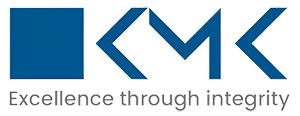Manual vs. Automated Bank Reconciliation

Introduction
Bank reconciliation is a fundamental financial process that ensures a company’s accounting records match its bank statements. It helps businesses maintain accurate cash flow records, detect errors, and prevent fraud. Traditionally, businesses relied on manual bank reconciliation, where accountants and bookkeepers would cross-check transactions line by line. However, with the rise of automated bank reconciliation software, businesses now have access to a faster and more accurate way to manage their finances.
At KMK, we help businesses transition from outdated manual processes to AI-driven reconciliation solutions that improve efficiency and financial accuracy. This blog explores the differences between manual and automated bank reconciliation, their pros and cons, and how to determine the best option for your business.
Key Differences Between Manual and Automated Reconciliation
Manual Bank Reconciliation
Manual reconciliation involves reviewing bank statements and comparing them with accounting records to identify discrepancies. This process typically includes:
- Manually entering transactions into accounting software or spreadsheets.
- Cross-checking transactions line by line with bank statements.
- Identifying missing, duplicate, or incorrect entries.
- Making necessary adjustments and corrections.
Automated Bank Reconciliation
Automated reconciliation uses cloud accounting software to match transactions automatically. The system imports bank transactions in real time and reconciles them with accounting records using AI and machine learning. Key features of automated reconciliation include:
- Auto-matching transactions to detect discrepancies instantly.
- Integration with accounting software (QuickBooks, Xero, NetSuite, etc.).
- Error detection and real-time alerts to prevent reconciliation issues.
- Reduction in manual effort, saving time and improving accuracy.
Pros and Cons of Each Method
Choosing between manual and automated bank reconciliation involves weighing the advantages and drawbacks of each approach. While manual reconciliation provides control and customization, it is labor-intensive and prone to human error. Automated reconciliation, on the other hand, offers speed and accuracy but requires an initial investment in software and training. Below, we break down the key pros and cons of each method to help you make an informed decision.
Manual Bank Reconciliation: Pros & Cons
Manual reconciliation remains a common practice for businesses that prefer full control over their financial processes. While it allows for a hands-on approach, it can be inefficient for growing businesses that handle a large volume of transactions. Below are the key pros and cons of manual reconciliation.
Related Blog: Common Bank Reconciliation Errors and How to Fix Them
Pros:
- Greater control over the reconciliation process.
- Allows for customized review of each transaction.
- No reliance on third-party software.
Cons:
- Time-consuming and prone to human error.
- Increased risk of discrepancies due to manual data entry.
- Not scalable for businesses with high transaction volumes.
Automated Bank Reconciliation: Pros & Cons
Automated reconciliation has transformed the way businesses manage their financial records by leveraging technology to improve efficiency and accuracy. By reducing the reliance on manual data entry and integrating real-time transaction matching, businesses can minimize errors and streamline their financial processes. Below are the key pros and cons of automated reconciliation.
Pros:
- Faster and more efficient, saving significant time.
- Minimizes errors with AI-powered transaction matching.
- Real-time reporting enhances financial visibility.
- Scalable for businesses of all sizes.
Cons:
- Requires initial setup and training to integrate with accounting systems.
- Some businesses may incur software subscription costs.
- Less manual oversight, which may require regular monitoring.
How to Choose the Best Option for Your Business
Selecting the right reconciliation method depends on the unique needs of your business. Factors such as transaction volume, error risk, scalability, and reporting requirements play a crucial role in determining whether manual or automated reconciliation is the best fit. Below are key considerations to help you make an informed decision.
-
Consider Your Transaction Volume
- Small businesses with fewer transactions may find manual reconciliation manageable.
- Businesses processing hundreds or thousands of transactions per month benefit more from automation.
-
Assess Your Risk of Errors
- Manual reconciliation increases the risk of data entry mistakes and discrepancies.
- Automated reconciliation reduces errors by auto-matching transactions in real time.
-
Evaluate Your Financial Reporting Needs
- Businesses needing real-time financial insights should opt for automated reconciliation.
- If manual oversight and deep transaction analysis are priorities, a hybrid approach may work.
-
Consider Scalability and Growth
- If your business plans to scale operations, automated reconciliation is the best long-term solution.
- Growing businesses can free up accounting resources by reducing manual tasks.
-
Factor in Cost and Budget
- While manual reconciliation requires no additional software, it consumes valuable employee time.
- Automated reconciliation tools have upfront costs but lead to long-term savings.
Read also: Strategic Outsourcing: How to Select the Best Offshore Accounting Partner
How KMK Can Help
At KMK, we provide outsourced bank reconciliation services to help businesses streamline their financial processes. Whether you choose manual or automated reconciliation, our experts ensure your financial records are accurate, compliant, and error-free. We leverage cloud accounting software, AI-driven automation, and customized reconciliation strategies to fit your business needs. By partnering with KMK, businesses can save time, minimize errors, and gain real-time financial insights to drive better decision-making.
Conclusion
Choosing between manual and automated bank reconciliation depends on factors like transaction volume, error risk, scalability, and financial reporting needs. While manual reconciliation offers control and customization, automated reconciliation is the superior choice for businesses looking to save time, reduce errors, and scale efficiently.
At KMK, we specialize in providing outsourced bank reconciliation services tailored to each client’s needs. Whether you are looking to transition from manual to automated reconciliation or need expert support, our team ensures seamless financial management.
Contact KMK today and discover how our advanced reconciliation solutions can optimize your business finances!
About the Author
Bert Wilson serves as our U.S. representative and client success manager, specializing in U.S. tax and accounting services. With expertise in tax compliance, financial reporting, and outsourced accounting solutions, Bert helps clients navigate complex financial challenges. Holding a Master’s degree in accounting and having obtained his C.P.A. license from the state of Colorado, he ensures client expectations are exceeded through tailored solutions and seamless collaboration with our India team. Passionate about building relationships, Bert enjoys both early mornings and outdoor sports, embodying a proactive approach to success
serves as our U.S. representative and client success manager, specializing in U.S. tax and accounting services. With expertise in tax compliance, financial reporting, and outsourced accounting solutions, Bert helps clients navigate complex financial challenges. Holding a Master’s degree in accounting and having obtained his C.P.A. license from the state of Colorado, he ensures client expectations are exceeded through tailored solutions and seamless collaboration with our India team. Passionate about building relationships, Bert enjoys both early mornings and outdoor sports, embodying a proactive approach to success
Let’s Take Our Conversation Ahead
KMK is a top outsourced accounting and tax service provider. We offer end-to-end accounting and tax services for small to mid-sized businesses, with a team of 1000+ professionals, including certified public, chartered, and staff accountants.
USA:
651 N Broad St Suite 205, Middletown, DE 19709, USA
Phone: 310-362-2511
India:
300, Sankalp Square-3B
Sindhu Bhavan Marg,
Ahmedabad, Gujarat 380058
For Career: 91-98240-42996
Developed by Bluele | Copyright © 2025 | KMK Ventures Private Limited. | All Rights Reserved


